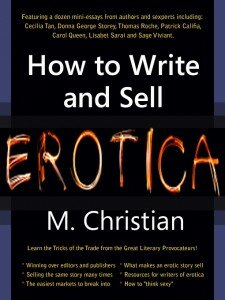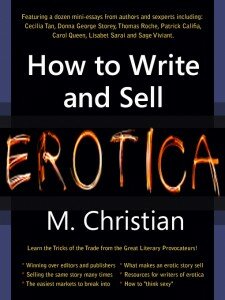
In regards to the last of erotica’s sins, a well-known publisher of sexually explicit materials put it elegantly and succinctly: “Just don’t fuck anyone to death.” As with the rest of the potentially problematic themes I’ve discussed here, the bottom line is context and execution: you can almost anything if you do it well—and if not well, then don’t bother doing it at all.
Violence can be a very seductive element to add to any genre, let alone erotica, mainly because it’s just about everywhere around us. Face it, we live in a severely screwed up culture: cut someone’s head off and you get an R rating, but give someone head and it’s an X. It’s kind of natural that many people want to use some degree of violence in their erotica, more than likely because they’ve seen more people killed than loved on-screen. But violence, especially over-the-top kind of stuff (i.e. run of the mill for Hollywood), usually doesn’t fly in erotic writing. Part of that is because erotica editors and publishers know that even putting a little violence in an erotic story or anthology concept can open them up to criticism from all kinds of camps: the left, the right, and even folks who’d normally be fence-sitters—and give a distributor a reason not to carry the book.
One of the biggest risks that can happen with including violence in an erotic story is when the violence affects the sex. That sounds weird; especially since I’ve often said that including other factors are essential to a well-written erotic story. The problem is that when violence enters a story and has a direct impact on the sex acts or sexuality of the character, or characters, the story can easily come off as either manipulative or pro-violence. Balancing the repercussions of a violent act on a character is tricky, especially as the primary focus of the story. However, when violence is not central to the sexuality of the characters but can affect them in other ways it becomes less easy to finger point—such as in noir, horror, etc—where the violence is background, mood, plot, or similar without a direct and obvious impact on how the character views sex. That’s not to say it isn’t something to shoot for, but it remains one of the harder tricks to pull off.
Then there’s the issue of severity and gratuitousness. As in depicting the actual sex in sex writing, a little goes a long way: relishing in every little detail of any act can easily push sex, violence, or anything else into the realm of comedy, or at least bad taste. A story that reads like nothing but an excuse to wallow in blood—or other body fluids—can many times be a big turn-off to an editor or publisher. In other words, you don’t want to beat a reader senseless.
But the biggest problem with violence is when it has a direct sexual contact. In other words, rape. Personally, this is a big button-pusher, mainly because I’ve only read one or two stories that handled it … I can’t really say well because there’s nothing good about that reprehensible act, but there have been a few stories I’ve read that treat it with respect, depth, and complexity. The keyword in that is few: for every well-executed story dealing with sexual assault there are dozens and dozens that make me furious, at the very least. I still remember the pro-rape story I had the misfortune to read several years ago. To this day, I keep it in the back of my mind as an example of how awful a story can be.
Sometimes violence can slip into a story as a component of S/M play. You know: a person assaulted by a masked intruder who is really (ta-da!) the person’s partner indulging in a bit of harsh role-play. Aside from being old hat and thoroughly predicable, stories like this can also fall into the “all pain is good pain for a masochist” cliché, unless, as with all things, it’s handled with care and/or flair.
Summing up, there is nothing you cannot write about: even this erotic “sin” or the others I’ve mentioned. However, some subjects are simply problematic in regards to sales potential: themes and activities that are loaded with emotional booby traps have to be carefully handled if the story is going to be seen as anything other than a provocative device. The affective use of these subjects has always been dependant on the writer’s ability to treat them with respect. If you have any doubts about what that might be, just imagine being on the receiving end: extrapolate your feelings as if one of your own personal traumas or sexual issues was used as a cheap story device or plot point in a story. Empathy is always a very important facility for a writer to develop—especially when dealing with sensitive or provocative issues.
In short, if you don’t like being beaten up, then don’t do it to someone else, or if you do, then try and understand how much it hurts and why. Taking a few body blows for your characters might make you a bit black and blue emotionally, but the added dimension and sensitivity it gives can change an erotic sin, something normally just exploitive, to … well, if not a virtue, then at least a story with a respectful sinner as its author.














Recent Comments